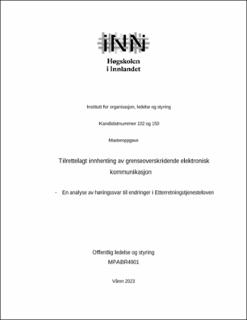| dc.description.abstract | Denne masteroppgaven er et dokumentstudie av høringssvarene til endringene til Etterretningstjenesteloven fra 2020. Oppgaven søker å svare på problemstillingen:
“Hva oppfattes som de største problemstillingene ved tilrettelagt innhenting av grenseoverskridende elektronisk kommunikasjon i Etterretningstjenesteloven?”
Oppgaven belyser hva som oppleves som de største problemstillingene tilknyttet innføringen av tilrettelagt innhenting av grenseoverskridende elektronisk kommunikasjon, som gir Etterretningstjenesten lovlig adgang til å drive innhenting mot all elektronisk kommunikasjon som går inn og ut av Norge. Videre gir oppgaven en gjennomgang av den kontekstuelle rammen for den nye lovgivningen og et innblikk i hva det betyr i praksis at Etterretningstjenesten får denne adgangen. I oppgaven analyserer vi høringssvarene som ble sendt inn i høringsprosessen. Høringssvarene blir analysert ut fra overvåkningsteoretiske perspektiver med sikte på å kartlegge hva som oppleves som de største problemstillingene. Høringssvarene ble sendt inn av en rekke ulike instanser, og vi undersøker om det er noen likheter eller forskjeller i de problemstillingene som blir lansert på tvers av gruppene.
Gjennom analysen ser vi at problemstillingene som blir tatt opp i høringssvarene samsvarer med det teoretiske rammeverket og Macnishs etiske prinsipper. På samme måte som Macnish sine prinsipper gjør seg relevante, blir Stoddarts motargumenter også vel så relevante, da de utgjør to sider av samme sak. Foucaults panoptiske overvåkningsteori har betydning for flere av problemstillingene, særlig når det gjelder journalisters kildevern og avkjølende effekt. Schartums sårbarhetsteori og poengmatrise, samt Marx' teori om konteksten for overvåkning bidrar også til å kaste lys over flere av høringssvarene, selv om andre deler av rammeverket anses som mer relevant. Vår analyse og vurdering av de ulike teoretiske perspektivene i denne oppgaven tilsier at Macnish, Stoddart og Foucault utgjør hoveddelen av rammeverket som treffer problemstillingen, og er best egnet til å si noe om hva som oppleves som de mest problematiske sidene ved tilrettelagt innhenting av grenseoverskridende elektronisk kommunikasjon.
Vi har identifisert at det er forskjeller i adresserte problemstilling fra de ulike høringsgruppene. Høringssvarene som er utformet fra offentlige etater er mest opptatt av lovtekniske problemstillinger. Disse instansene vil naturlig kunne identifisere problematiske sider ved hvordan en lovtekst er utformet, samt ha evne til å forskuttere og identifisere potensielle implikasjoner ved uklar lovformulering. Arbeidstaker- og interesseorganisasjoner er i høy grad opptatt av lovtekniske problemstilling, samt problemstillinger som går på økonomi, drift og ressurssetting. Privatpersoner er mer bekymret for overvåkning i seg selv og problemstillinger rundt EMK art. 8 som handler om retten til privatliv. Det er naturlig at ingen privatpersoner ønsker å bli overvåket og at retten til privatliv opprettholdes. Private virksomheter har økonomi, drift og ressurssetting som en hovedproblemstilling i tillegg til domstolskontroll. På tvers av alle kategoriene er det flest høringssvar som har problematisert overvåkning og domstolskontroll, uavhengig av type høringssubjekt. Våre funn indikerer at overvåkning av befolkningen, samt svak eller mangelfull domstolskontroll oppleves som det mest problematiske ved tilrettelagt innhenting av grenseoverskridende elektronisk kommunikasjon. | |
| dc.description.abstract | This master's thesis is a document study of the responses to the changes made to the Norwegian Intelligence Service Act in 2020. The thesis seeks to answer the research question: "What are perceived as the main issues related to the targeted acquisition of cross-border electronic communication in the Norwegian Intelligence Service Act?"
The thesis examines what is perceived as the major issues associated with the introduction of targeted acquisition of cross-border electronic communication, which gives the Intelligence Service legal access to gather all electronic communication entering and leaving Norway. Additionally, the thesis provides an overview of the contextual framework for the new legislation and an insight into what it means in practice for the Intelligence Service to have this access. In the thesis, we analyze the responses submitted during the consultation process. The responses are analyzed from a surveillance theoretical perspective, with the aim of identifying the major issues. The responses were submitted by various organizations, and we investigate whether there are any similarities or differences in the issues raised across the groups.
Through our analysis, we observe that the issues raised in the responses align with the theoretical framework and Macnish's ethical principles. Similarly, Stoddart's counterarguments are equally relevant, as they represent two sides of the same issue. Foucault's panoptic surveillance theory is relevant to several of the issues raised, particularly with regard to journalists' source protection and chilling effects. Schartum's vulnerability theory and point matrix, as well as Marx's theory of the context of surveillance, also shed light on several of the responses, although other parts of the framework are considered more relevant. Our analysis and evaluation of the different theoretical perspectives in this thesis suggest that Macnish, Stoddart, and Foucault constitute the main part of the framework that addresses the research question and are best suited to shed light on what is perceived as the most problematic aspects of targeted acquisition of cross-border electronic communication.
We have identified differences in the issues addressed by the different consultation groups. Responses from public agencies are mostly concerned with legal-technical issues. These agencies are naturally able to identify problematic aspects of how a legal text is formulated and have the ability to anticipate and identify potential implications of unclear wording. Employee and interest organizations are highly concerned with legal-technical issues, as well as issues related to finance, operations, and resource allocation. Private individuals are more concerned about surveillance itself and issues related to Article 8 of the European Convention on Human Rights, which deals with the right to privacy. It is natural that no private individuals want to be monitored, and the right to privacy is maintained. Private companies consider finance, operations, and resource allocation to be the main issue, in addition to judicial oversight. Across all categories, there are more responses that have problematized surveillance and judicial oversight, regardless of the type of consultation subject. Our findings indicate that the surveillance of the population, as well as weak or inadequate judicial oversight, are perceived as the most problematic aspects of targeted acquisition of cross-border electronic communication. | |
